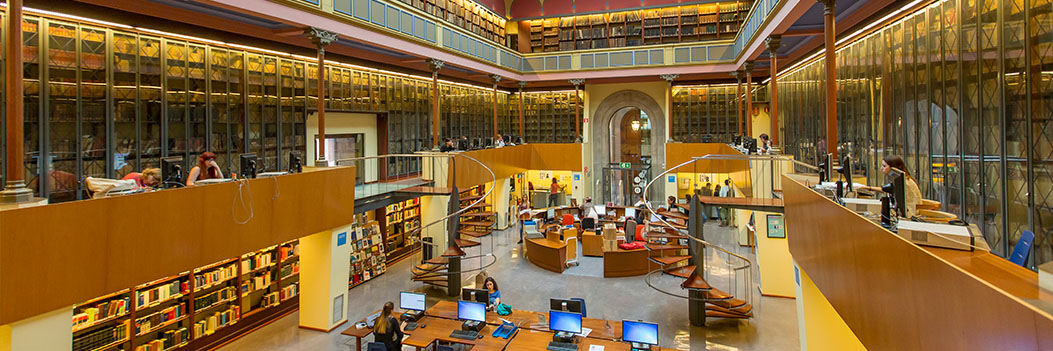Research office
Research

The UB hosts an exhibition on Alfonso X
The exhibition is part of the activities promoted by the section of French, Italian, Galician and Portuguese Studies of the Department of Modern Languages and Literatures and of English Studies of the Faculty of Philology and Communication
On Thursday 25 January at 6.30 p.m., in the Paranymph Hall of the Historic Building of the University of Barcelona, the exhibition "Alfonso X and Galicia", organized by the Galician Culture Council and curated by Antoni Rossell, professor of Romance Philology at the University Autonomous of Barcelona, will be inaugurated. The Philology and Communication CRAI Library will also host the exhibition "A memoria do son", on medieval musical instruments.
The exhibition "Alfonso X and Galicia", which will remain open to the public until 22 February, is accompanied by a series of events, conferences and concerts in other venues in the city, such as the Library of Catalonia, the Boqueria market, the UAB and the UB.
The exhibition aims to explain the link between Alfonso X and Galicia and the Galician language. The exhibition presents the figure of the monarch objectively: the political vicissitudes, the scientific, literary and cultural work and the relationship with the Atlantic country and its language, based on documents and archaeological, literary and musical testimonies, and particularly the reconstruction of medieval musical instruments.
The exhibition places special attention to the Marian corpus of the king, the Cantigas de Santa María, one of the most important medieval monuments of Galician language and culture, as well as of European medieval literature and music.
In 2021, the 800th anniversary of the birth of King Alfonso X, King of Castile, León and Galicia (1252-1284) was celebrated. Coinciding with the event, the Galician Culture Council inaugurated the exhibition "Alfonso X e Galicia" in Santiago de Compostela, which is now displayed in Barcelona.
It is worth noting the coincidence that in the vestibule of the Historical Building there is a sculpture of King Alfonso X, the work of Agapit Vallmitjana from 1871, which forms part of the sculptural programme designed by the architect Elies Rogent to symbolize the great milestones of knowledge in the different periods of Spanish history, through some of its most successful protagonists. The other four sculptures are of Averrois, Ramon Llull, Isidoro de Sevilla and Lluís Vives.
Alfonso X (1221-1284) played a prominent role in the Reconquista, the occupation of Jerez in 1253 and Cadiz in 1262. He is known by the nickname "el Sabio" (the Wise), due to the cultural legacy he fostered, in which the promotion of the Toledo School of Translators, made up of a plural community of philologists from different religions and backgrounds, stands out. This written output can be divided into scientific, legal, historical and literary works, in which Castilian was promoted as a cultured language as opposed to Latin. He was the son-in-law of Jaime I, when he married his daughter Violante de Aragon in 1248, and visited Barcelona at Christmas in 1274.



